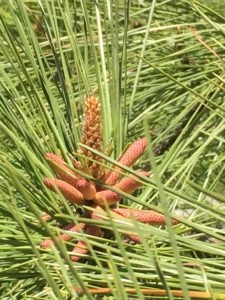Have you been caught off guard again? It is that time of year when pine pollen begins to coat cars, sidewalks, outdoor furniture, and other surfaces. This yellow film of pollen is necessary for the production of pine seeds that grow to become pine trees. Without this pollen, pine trees could not reproduce to provide us the trees we depend on for the building of our homes and other daily uses of wood. In North Carolina, the pine pollen season is a reminder of the importance of the pine tree to our state, that it supports the forest industry, which has a $32.8 billion dollar impact on North Carolina's economy.
To determine when the pine pollen season will begin and when the trees will be producing the maximum amount of pollen one needs to estimate the number of degree-days above 55° Fahrenheit after February 1. To determine degree-days, add the positive differences between the daily high temperature and 55 degrees. When the total degree-days sum to approximately 300 degree-days we begin to see the pine tree releasing pollen. Once a sum total of 636 degree-days is reached, pollen production is at its peak. In the Raleigh area, pine pollen production is just beginning, and if the weather pattern holds, it should reach peak production by mid-April.
The overall pine pollen season can last weeks. The amount of pine pollen in the atmosphere tend to be highest early in the morning on warm, dry, breezy days and lowest during chilly, wet periods. The amount of pine pollen varies widely within local areas and among geographic regions. Weather conditions have a major impact on the pine pollen season. A rainy spring or late spring frost can often reduce the amount of pine pollen in the atmosphere. Since you cannot evade the pine pollen, predicting when the season begins, and when production is at its peak, may help you in finding ways to minimize the pollen's impact.
Publication date: March 22, 2019
Reviewed/Revised: Feb. 4, 2025
N.C. Cooperative Extension prohibits discrimination and harassment regardless of age, color, disability, family and marital status, gender identity, national origin, political beliefs, race, religion, sex (including pregnancy), sexual orientation and veteran status.

